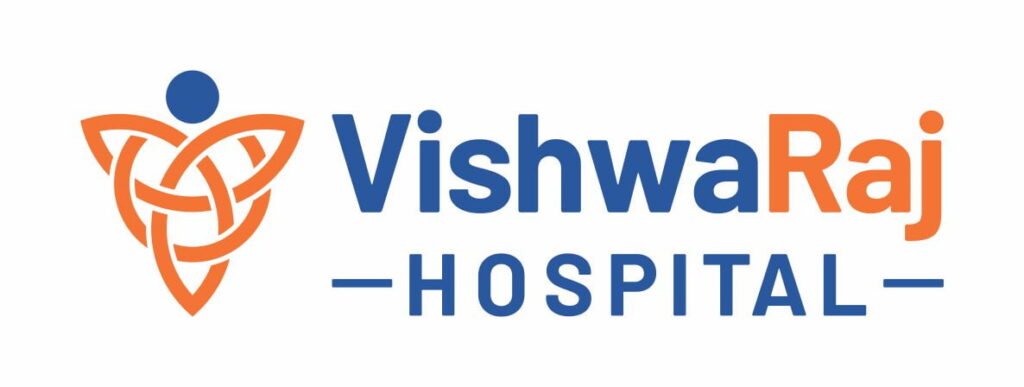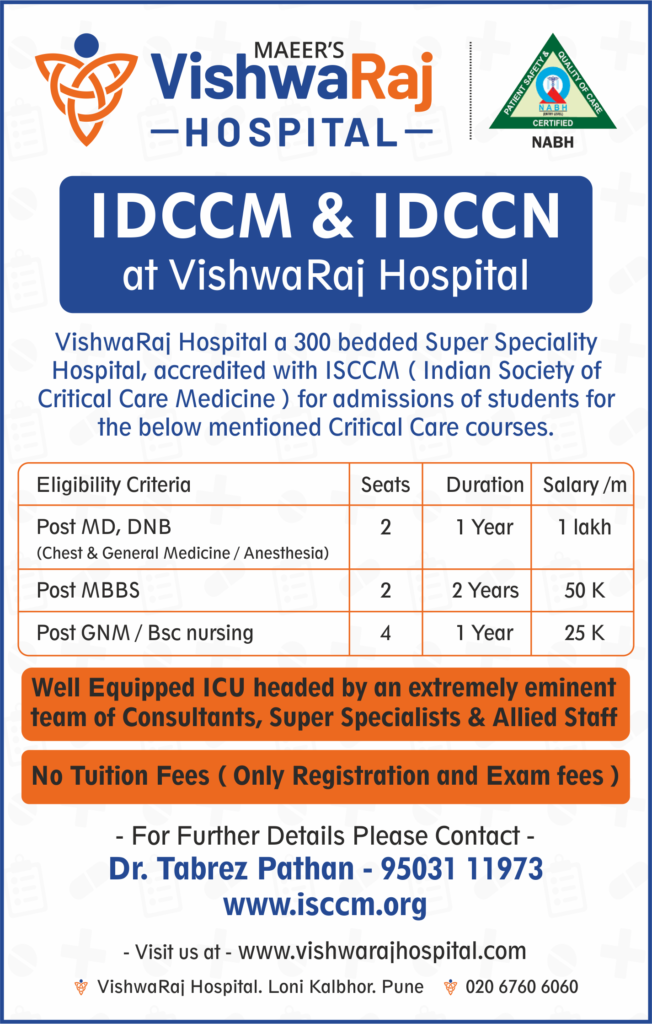IDCCM AT VISHWARAJ HOSPITAL
Critical Care Medicine (CCM) is an evolving specialty overlapping multiple primary specialties. Recognizing the increasing need to consolidate the field and to promote awareness, continuing education and research in this field, the Indian Society of Critical Care Medicine (ISCCM) was Formed on 9th October 1993.
The sole aim of these training programs is to enhance the skills of care providers who are working in the field of Critical Care Medicine so that patient care can be standardized and good quality care can be provided to patients.These courses are not recognized by Medical Council of India.
Duration
Duration of the Indian Diploma in Critical Care Medicine (IDCCM) is one year for MD/MS/DNB candidates and 2 years for DA/DTCD or equivalent candidates.
Duration of the Indian Diploma in Critical Care Medicine (IDCCM) is one year for FCPS Medicine candidates (w.e.f January 2020 registrations).
Eligibility
- - Diploma in Anaesthesia/Diploma in Chest diseases.
- - MD Medicine/Chest/Anaesthesia
- - DNB Medicine/Chest/Anaesthesia
- - MD/DNB Emergency Medicine
- - MRCEM-If approved by the Medical Council of India
- - FCPS Medicine
- - The base qualifications must be from a MCI recognized university.
- - In case of any doubt/controversy regarding the eligibility, the course coordinator should be consulted. Decisions by the ISCCM executive committee in this regard will be final & binding.
Post MBBS
The sole aim of these training programs is to enhance the skills of care providers who are working in the field of Critical Care Medicine so that patient care can be standardized and good quality care can be provided to patients.These courses are not recognized by Medical Council of India.
Critical care is an upcoming speciality and presently has a huge shortage of trained dedicated manpower. MBBS doctors are a major workforce in ICU teams. This course has been proposed to impart structured critical care training to MBBS doctors to improve patient management skills.
Eligibilty: MBBS or equivalent allopathic medical degree with valid MCI registration.
ISCCM DIPLOMA IN CRITICAL CARE NURSING
- 1. Provide quality care to critically ill patients.
- 2. Manage & supervise care of critically ill patients.
- 3. Teach nurses, allied health professionals and family members in areas related to critical care nursing.
- 4. Conduct research in areas of critical care nursing.
- 1. Appreciate trends and issues related to Critical Care Nursing
- 2. Describe the epidemiology, etiology, pathophysiology and diagnostic assessment of critically ill patients.
- 3. Describe the various drugs used in critical care by nurses - Responsibility in their administration.
- 4. Demonstrate advance skills/competence in managing critically ill patients including Advance Cardiac Life Support.
- 5. Demonstrate skill in handling various equipments used in ICU.
- 6. Provide comprehensive care to critically ill patients.
- 7. Appreciate team work & coordinate activities related to patient care.
- 8. Practice infection control measures.
- 9. Assess and manage pain.
- 10. Identify complications & take appropriate measures.
- 11. Assist patients and their family to cope with emotional distress, grief and anxiety
- 12. Assist in various diagnostic, therapeutic and surgical procedures.
- 13. Identify the sources of stress and manage burnout syndrome among health care providers.
- 14. Teach and supervise nurses and allied health workers.
- 15. Design a layout of ICU and develop standards for critical care nursing practice




